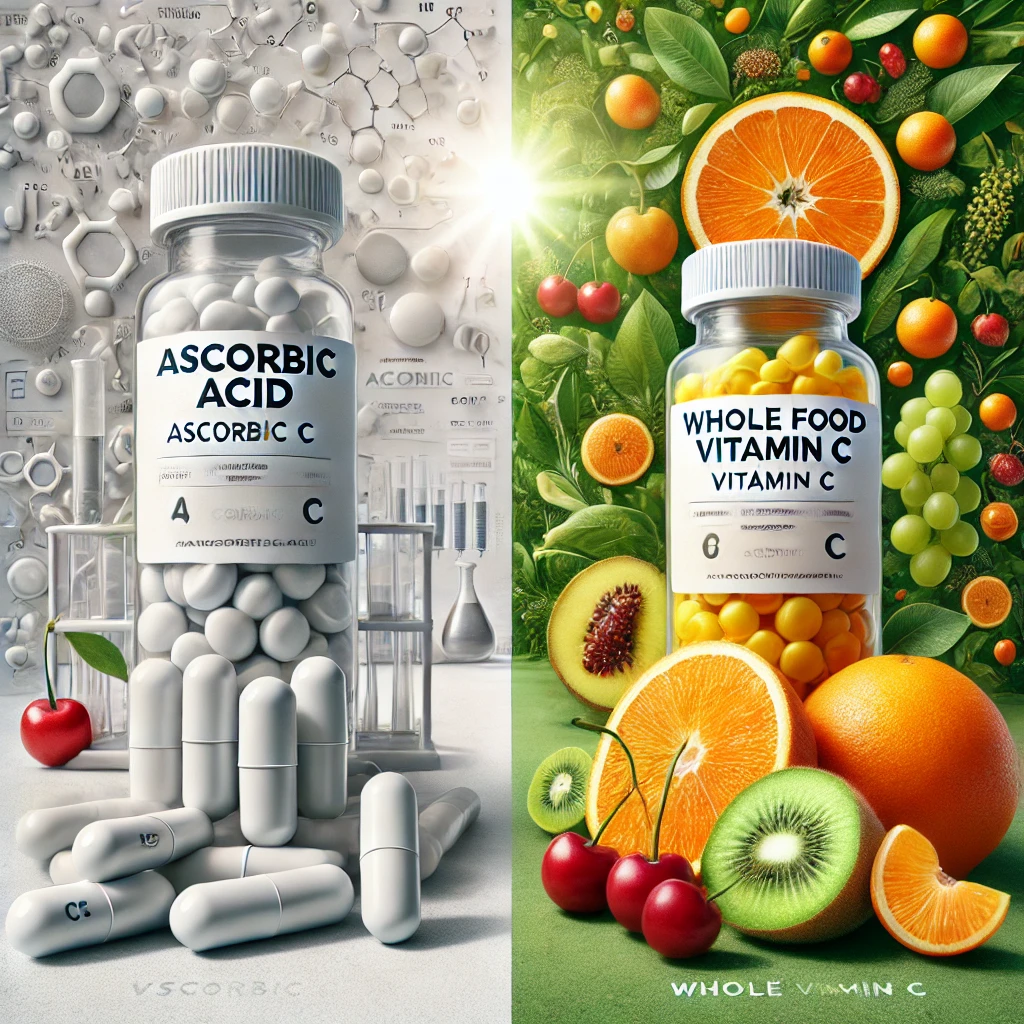When it comes to Vitamin C, not all forms are created equal. You may have seen supplements labeled as “ascorbic acid” or “whole Vitamin C” and wondered which one is more beneficial for your health. Although both forms provide essential Vitamin C, there are some key differences that impact their effectiveness, absorption, and potential health benefits. In this blog, we’ll break down the differences between whole Vitamin C and Ascorbic Acid, explore the pros and cons of each, and discuss recommended dosages based on research.

What is Ascorbic Acid?
Ascorbic Acid is the synthetic, isolated form of Vitamin C found in most supplements. It is a pure chemical compound that mimics the Vitamin C found in nature, but it is often produced in laboratories using glucose derived from corn or other sources. Ascorbic acid is water-soluble and easily absorbed by the body, but it lacks the additional nutrients and cofactors present in whole-food sources of Vitamin C.
Benefits of Ascorbic Acid:
- Boosts Immune Function: Ascorbic Acid has been shown to enhance the immune system by supporting the production of white blood cells and improving the body’s defense against infections.
- Powerful Antioxidant: Ascorbic Acid works as an antioxidant, protecting cells from oxidative damage caused by free radicals, which can contribute to chronic diseases and aging.
- Affordable and Widely Available: Ascorbic Acid supplements are often more affordable and readily available than whole-food-based Vitamin C products.
A study published in the American Journal of Clinical Nutrition showed that Ascorbic Acid supplementation improved antioxidant levels in healthy adults and supported immune health during times of stress.

What is Whole Vitamin C?
Whole Vitamin C is derived from natural sources like fruits (especially citrus), vegetables, and herbs. It includes not only Ascorbic Acid but also other components like bioflavonoids, enzymes, and co-nutrients that work together synergistically to enhance the absorption and efficacy of Vitamin C. These additional compounds provide more comprehensive benefits than ascorbic acid alone.
Benefits of Whole Vitamin C:
- Better Absorption: The presence of bioflavonoids and other cofactors in whole Vitamin C can improve the body’s ability to absorb and utilize Vitamin C more effectively.
- Supports Collagen Production: Whole Vitamin C is particularly effective in supporting collagen synthesis, which is essential for maintaining healthy skin, joints, and connective tissues.
- Less Risk of Side Effects: Since whole Vitamin C is typically derived from natural sources, it is less likely to cause digestive upset, which can sometimes occur with high doses of synthetic ascorbic acid.
A 2019 study in Nutrients found that participants who took whole-food Vitamin C had better absorption rates and higher retention of the nutrient in their systems compared to those who took synthetic Ascorbic Acid alone.
Whole Vitamin C vs. Ascorbic Acid: Pros and Cons
Both forms of Vitamin C offer benefits, but each has its pros and cons depending on your individual health needs and lifestyle.
Pros of Ascorbic Acid:
- Highly Effective in Immune Support
- Numerous studies show that ascorbic acid can enhance immune function, particularly in high doses during illness.
- Cost-Effective
- Synthetic Ascorbic Acid supplements are typically much cheaper than whole-food Vitamin C products.
- Easy to Find
- Most Vitamin C supplements on the market are in the form of ascorbic acid, making it widely accessible.
Cons of Ascorbic Acid:
- Lacks Nutrient Synergy
- Ascorbic Acid does not contain the additional bioflavonoids and other nutrients found in natural sources of Vitamin C, which can limit its effectiveness.
- Potential Side Effects at High Doses
- Some people experience digestive issues like diarrhea, bloating, or stomach cramps when taking high doses of ascorbic acid.

Pros of Whole Vitamin C:
- Better Absorption and Utilization
- The natural compounds in whole Vitamin C, such as bioflavonoids, enhance the body’s ability to absorb and use Vitamin C.
- Full-Spectrum Nutritional Support
- Whole Vitamin C provides more than just Ascorbic Acid, offering a range of antioxidants and cofactors that boost overall health.
- Gentler on Digestion
- Whole Vitamin C is typically easier on the stomach, reducing the risk of digestive upset even at higher doses.
Cons of Whole Vitamin C:
- More Expensive
- Whole-food Vitamin C supplements tend to be more costly compared to synthetic Ascorbic Acid.
- Harder to Find
- Whole Vitamin C supplements can be less widely available, particularly in comparison to synthetic Vitamin C products.
Dosage Recommendations
The recommended daily intake of Vitamin C depends on age, gender, and individual health needs. According to the National Institutes of Health (NIH), the general recommendations for adults are:
- Women: 75 mg/day
- Men: 90 mg/day
- Smokers: An additional 35 mg/day (due to increased oxidative stress)
- Pregnant/Breastfeeding Women: 85-120 mg/day depending on lactation needs
However, when supplementing with Ascorbic Acid or Whole Vitamin C, many health professionals suggest higher doses for enhanced benefits. Doses of 500 mg to 1,000 mg per day of Vitamin C are commonly recommended for immune support or to combat oxidative stress. It’s important to note that exceeding 2,000 mg per day can cause digestive side effects, especially with synthetic Ascorbic Acid.
Potential Risks and Side Effects
Both Whole Vitamin C and Ascorbic Acid are generally safe for most people when taken in appropriate amounts. However, taking excessively high doses of Ascorbic Acid may lead to side effects such as diarrhea, nausea, and stomach cramps. It’s always best to follow the recommended dosage and consult with a healthcare professional if you plan to take high doses of any Vitamin C supplement, especially if you have underlying health conditions.
A study in The Journal of Nutrition emphasized that while high-dose Ascorbic Acid supplementation is effective for short-term immune support, it can lead to gastrointestinal discomfort if not properly managed.
Final Thoughts: Which One is Better?
Both whole Vitamin C and Ascorbic Acid have their place in supporting your health, but which one is better depends on your needs and preferences. If you’re looking for a cost-effective way to boost your immune system or need high doses during illness, Ascorbic Acid can do the job. However, if you want a more natural, comprehensive approach with better absorption and fewer side effects, Whole Vitamin C might be the better choice.
No matter which form you choose, ensuring you get enough Vitamin C through diet or supplements is a key factor in maintaining overall health and wellness.
References
Bioavailability and Effectiveness of Synthetic vs. Natural Vitamin C: Carr, A. C., & Vissers, M. C. M. (2013). Synthetic or food-derived vitamin C – Are they equally bioavailable? Nutrients, 5(11), 4284-4304.
Vitamin C and Immune Function: Hemilä, H. (2017). Vitamin C and infections. Nutrients, 9(4), 339.
Ascorbic Acid and Whole Vitamin C: Johnston, C. S., & Luo, B. (1994). Comparison of the absorption and urinary excretion of ascorbic acid alone or as a component of a multi-nutrient supplement. The Journal of the American College of Nutrition, 13(4), 344-349.
Synergy of Nutrients in Whole Vitamin C: Frei, B., & Trabe, M. G. (2001). Ascorbic acid is not the only pharmacologically relevant form of Vitamin C. The American Journal of Clinical Nutrition, 72(1), 316S-321S.
Vitamin C and Collagen Synthesis: Pullar, J. M., Carr, A. C., & Vissers, M. C. (2017). The roles of Vitamin C in skin health. Nutrients, 9(8), 866.



